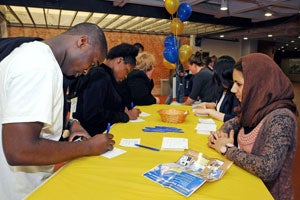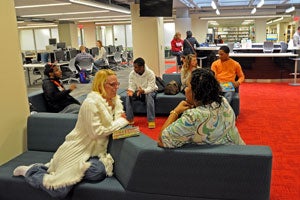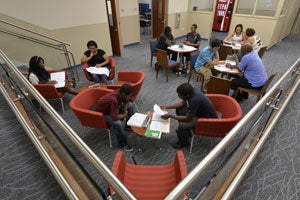Students Combine Engineering & Environmentalism to Create Hydroponic Garden

��
(Delaware and Chester Counties, PA��• June 1, 2015)—�����ϲ� students combined their interest in environmentalism and engineering to show the campus community that a little ingenuity goes a long way in sustainability. The result is an on-campus hydroponic garden featuring bok choy, kale, Romaine lettuce, Swiss chard and other vegetables. It’s a joint effort between members of two student organizations: the Women in Science, Technology, Engineering and Mathematics (STEM) club and the Modern Environmental Sustainability Association (MESA).
“We wanted to teach students that there’s an alternative way to grow your own vegetables, especially in Pennsylvania where the weather is unpredictable. With a hydroponic garden it’s easier to have control over what you’re growing,” says Liliana Lobaton, President of MESA and Vice President of Women in STEM.
“It’s important to show students that you don’t have to have a lawn to grow your own vegetables and be sustainable. It’s possible to do something like this,” adds Ryan Potts, Vice President of MESA.
A hydroponic garden is soilless and involves growing plants in a mineral nutrient solution with water. Hydroponic plants generally grow faster and are healthier than soil plants, plus they use less water, do not cause topsoil erosion and require little to no pesticides. This makes hydroponic gardening a sustainable option available to everyone.
On campus, the garden, located in the STEM Center, is providing an experiential learning opportunity to students. They tend it between classes and on weekends, and they’re also collecting data on each plant to better understand what conditions and factors influence growth rates. At least one professor already has plans to use this data to run experiments in his lab classes.
“This is a great research opportunity for students,” notes Sandra Devenny, Associate Professor of Biology and faculty advisor for Women in STEM, adding that there’s often a misconception that undergraduate research doesn’t take place at the community college level.
And it’s not just science majors who are involved. The efforts are sparking interest in sustainability around the College while also illustrating to students the benefits of getting involved in campus activities. “We’re showing on a small scale that we can build community and collaborations with other clubs,” says Dr. Matthew Wilsey-Cleveland, faculty advisor for MESA and Assistant Professor of English.
Club members are grateful to the College’s Plant Operations staff who donated materials and labor to create the hydroponic garden along with an outdoor community garden that features vegetables and herbs. When everything is ready for harvest, it will be available for free to the College community. Whatever is leftover will be donated to a food bank in Media.
Photo Caption: Students in �����ϲ�’s MESA club and Women in STEM club pose with their advisors in front of the hydroponic garden they helped create on campus. From left to right: Kyle Dorrin, Alaina Bertoline, Samantha Bundrick, Ryan Potts, Liliana Lobaton, John Donlan, Dr. Matthew Wilsey-Cleveland, faculty advisor for MESA, Gerald Gardner, Sandy Gera, advisor for Women in STEM, and Sandra Devenny, faculty advisor for Women in STEM.����








